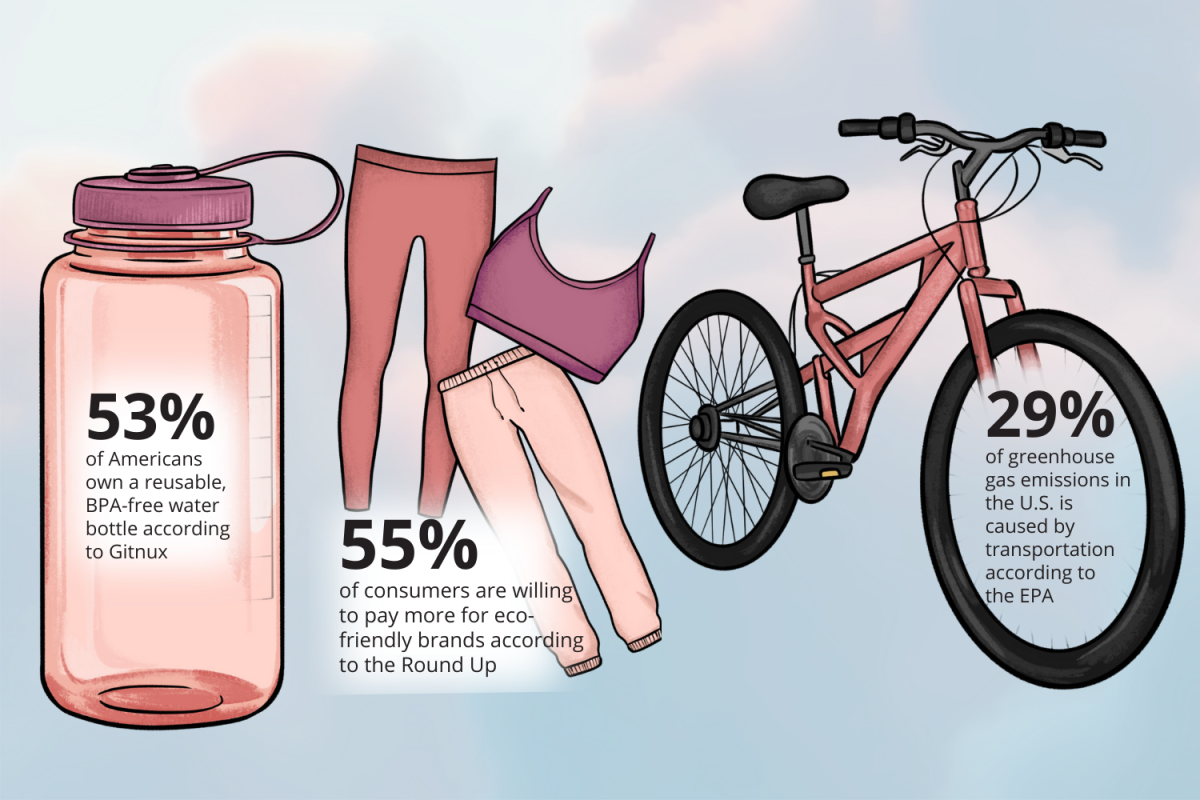Parallel to the arena of sports, there’s a second game being played — one that aims to safeguard the planet. As awareness of environmental issues increases, sports play a crucial role in promoting sustainability. Through various methods both in and out of the game, there are many methods in which the sports industry can and have been working toward a greener world.
Hydration through habitual reusage
Water is a vital aspect of performance, safety and overall health in sports. Athletes, from casual joggers to Olympic competitors, understand the importance of staying hydrated to maintain their physical condition and support their bodies. The universal need for water across all sports provides a significant opportunity for sustainability, especially in the types of containers used.
There has been a prominent increase in the usage of reusable water bottles, as the global reusable water bottle market is expected to grow at a compound annual growth rate of 4.4% over the next six years. This shift away from the convenience of grabbing a single-use plastic water bottle before a game is noteworthy in contributing to environmental conservation efforts.
Despite the recyclability of these bottles, around 60 million plastic bottles end up in landfills every day in the United States, where they take up to 450 years to decompose, slowly breaking down into microplastics that pollute ecosystems. This pollution harms natural habitats, in turn affecting wildlife and food chains. Reusable water bottles in the sports community has not only minimized the amount of plastic waste finding its way into landfills and oceans but has also encouraged others to take on this habit as well.
“I think that reusable water bottles are great because not only do they reduce plastic waste and reduce exposures and harms, but they are more efficient than their plastic alternatives,” junior and Conservation Action Association officer Medha Nalakonda said.
Walking and biking toward sustainability
Lynbrook’s suburban neighborhood provides the perfect opportunity for adopting more sustainable modes of transportation like walking, running or biking. These practices have not only been proven to contribute to one’s physical and mental health but also significantly reduce carbon emissions. .
According to the Environmental Protection Agency, transportation accounts for about 29% of greenhouse gas emissions in the U.S., with personal vehicles being a significant contributor. Switching short car trips under five miles to walking or biking can save about two kilograms of carbon dioxide emissions per trip.
Increasingly, Lynbrook has also promoted these sustainable practices on campus. Prior to COVID-19, PTSA had hosted the annual Walk or Bike to School Day event, which is now organized by CAA.
“Many of us already have bikes, so there is basically no environmental impact in biking or walking, while cars release a ton of greenhouse gasses and are highly inefficient at transporting people,” senior and CAA President Nicholas Kong said. “I think the event was pretty successful and we’ll be hosting one again this year near Earth Day.”
When athletics align with organic materials
When purchasing athletic wear, there are many different options of materials for these products. However, not all materials are eco-friendly and plastic-free. Plastic-based materials such as polyester and spandex are not biodegradable and would further contribute to environmental pollution. While exercising, these synthetic materials also may not be as breathable or comfortable.
Instead, clothing made with natural materials, skin safe dyes and plastic-free packaging are healthier and better for the environment. Some examples of such brands include Asquith, which makes their products out of bamboo and organic cotton, as well as Cottonique, which is certified by the Global Organic Textile Standard and is free of spandex and latex. Furthermore, natural athletic wear is also more durable and could last for a longer duration.
Other approaches to sustainability in sports
Aside from these already common strategies of conserving the environment, there are various other methods that can be used. Donating old gear and equipment that an athlete has grown out of rather than simply throwing it away finds ways to repurpose. When attending sporting events, digital rather than paper tickets help avoid unnecessary paper waste. Eco-friendly facilities offer benefits from energy efficiency to environmental conservation. Regardless of the strategies being used, everyone can take actions to help save our planet.
“Right now we are going through various environmental issues,” Nalakonda said. “Although we should have started sustainable practices much earlier, it’s never too late to start. Even by slightly reducing pollution, we can make a meaningful difference and contribute to improving our community.”




































































